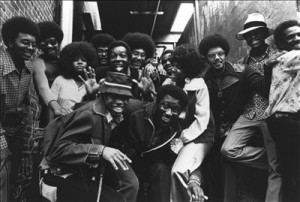 Today we celebrate the career of Norman Whitfield. He came from Harlem, but by time he was in his late teens the family had moved to Detroit. It was an event that would have historic consequences from a music perspective. It wasn’t long before Whitfield started hanging around the Hitsville USA offices, home to Motown Records.
Today we celebrate the career of Norman Whitfield. He came from Harlem, but by time he was in his late teens the family had moved to Detroit. It was an event that would have historic consequences from a music perspective. It wasn’t long before Whitfield started hanging around the Hitsville USA offices, home to Motown Records.
Whitfield’s persistence eventually paid off when Berry Gordy, Jr. hired him to work in Motown’s quality control office. It was there that decisions were made about what records the company would release, and those that they wouldn’t. Whitfield’s next stop in the company hierarchy found him working as a staff songwriter. In that role he co-wrote hits like Marvin Gaye’s “Pride and Joy,” the Marvelettes “Too Many Fish in the Sea,” and the Velvelettes “Needle in a Haystack.” Despite his success as a songwriter, his star would rise even higher.
The big break for Whitfield came when the Temptations single “Get Ready” didn’t do the business that Gordy was expecting. Smokey Robinson had written and produced the record and his contract with Motown called for a certain level of success. Although Robinson was the main Temptations producer it was Whitfield who had produced “Ain’t Too Proud to Beg,” which was a bigger hit than “Get Ready.” The writing was on the wall.
“Get Ready” was the last record that Robinson, who had written “My Girl,” made with the Temptations. Gordy anointed Whitfield to take his place as the group’s main producer, and for the next eight years, from 1966-1974, Whitfield produced pretty much every Temptations record. In the process he wrought major changes in the classic sound of the group.
Whitfield had forged a songwriting partnership with Barrett Strong early on, and together they wrote a song called “I Heard it Through the Grapevine,” (originally recorded by Smokey Robinson & the Miracles) with which Whitfield produced hits for Marvin Gaye and Gladys Knight & the Pips. In 1968, David Ruffin departed the Temptations and was replaced by Dennis Edwards. Whitfield decided that the time was right to change things up, employing rock and funk arrangements on the Temptations records and making use of the psychedelic effects that were commonplace in popular music in those days.
The new style became known as “psychedelic soul,” and the first Temptations hit to feature this sound was “Cloud Nine” which appeared at the end of 1968. It was a #6 hit for the Tempts which was equalled by their next Whitfield-produced hit “Runaway Child, Running Wild.” “I Can’t Get Next To You” did even better, making it all the way to #1 in 1969. “Psychedelic Shack” was a nice-sized hit, and “Ball of Confusion” even bigger. Two more #1 hits followed for the Temptations, “Just My Imagination (Running Away With Me)” and the biggest hit of them all “Papa Was a Rollin’ Stone” in 1972.
While he was creating all of these hits for the Temptations, Whitfield was working with other artists as well and made hits like “Friendship Train” for Gladys Knight & the Pips, “Too Busy Thinking About My Baby” for Marvin Gaye, “War” for Edwin Starr (a song originally recorded by the Temptations), and “Smiling Faces Sometimes” for the Undisputed Truth.
The Undisputed Truth was a group put together by Whitfield so that he could explore the psychedelic soul sound further. Joe Harris was the lead singer, joined by vocalists Billy Rae Calvin and Brenda Joyce Evans. In some ways, Whitfield used the Undisputed Truth as his laboratory. For example, it was that group that recorded the original version of “Papa Was a Rollin’ Stone” but their version only made it to #63 on the pop chart. It worked both ways though. It was the Temptations, guided by Whitfield, who recorded the original version of the Undisputed Truth’s biggest hit “Smiling Faces Sometimes.”
The Temptations had recorded “Smiling Faces Sometimes” earlier in 1971. The 12-minute song was included on their Sky’s the Limit album. They planned to release an edited version of the song as a single that summer, but then Eddie Kendricks got fed up and left the group, and plans for a single release were scuttled. That worked to the benefit of the Undisputed Truth when Whitfield gave the song to them to record and together they turned it into a #3 hit.
When Motown left Detroit in 1973, Whitfield left Motown and started his own label, Whitfield Records. The Undisputed Truth followed him out the door, as did Motown acts Rose Royce, Willie Hutch, Junior Walker, and Edwin Starr. The Undisputed Truth Never had a hit nearly as big as “Smiling Faces Sometimes,” but Whitfield scored again with “Car Wash,” a huge hit for Rose Royce in 1976.
A few years later Whitfield returned to Motown, and the Temptations, producing their 1983 single “Sail Away.” He died in 2008 after a long battle with diabetes, leaving behind him some of the most glorious, unforgettable records in the history of popular music.
https://www.youtube.com/watch?v=8CJZcVi5BA4






Comments